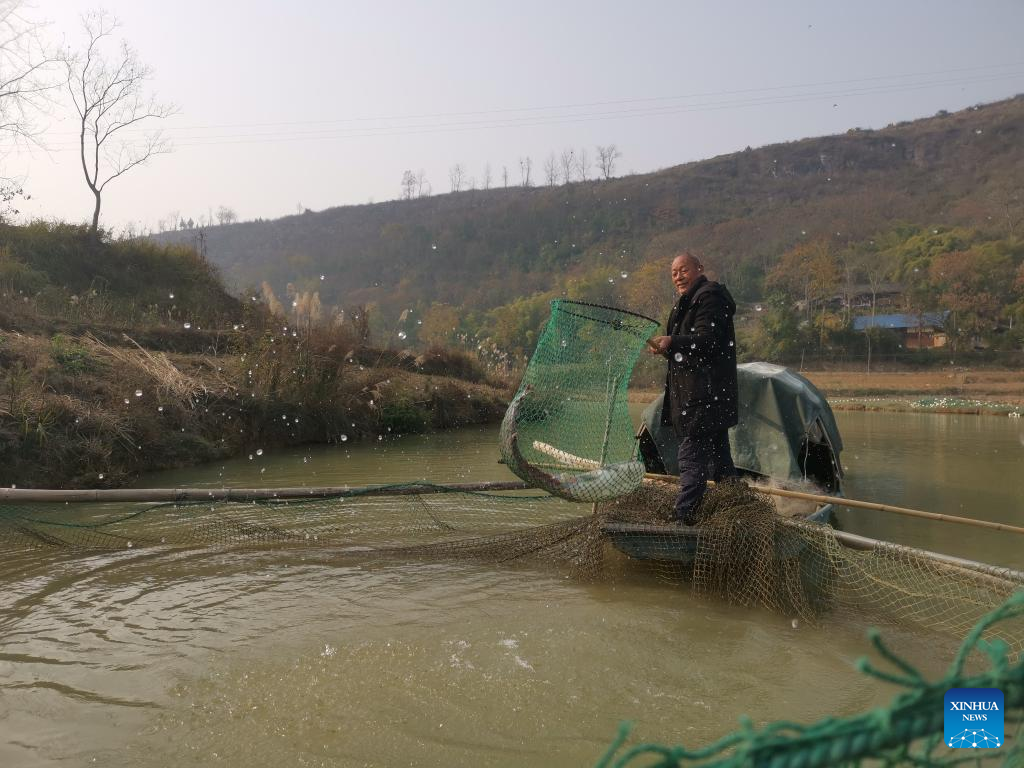Fisherman embraces new life ashore after Yangtze fishing ban

This photo taken with a mobile phone shows Wang Chaosheng netting fish at his pond in Sinan County, southwest China's Guizhou Province, Jan. 11, 2023. (Xinhua/Wang Jun)
GUIYANG, Feb. 1 (Xinhua) -- During the just-ended Spring Festival holiday, Wang Chaosheng has been busy keeping fish as his ponds welcomed new fry. He was glad to witness his new business flourish.
Living in Sinan County, southwest China's Guizhou Province, the 60-year-old ex-fisherman had spent 27 years fishing on Wujiang River, a tributary of the upper reaches of the Yangtze River, China's "mother river."
In rural areas, most villagers used to rely on farming as the main means of income. But for Wang, the majority of the family income came from fishing.
After Wang completed the fish catching, the fresh wild fish soon sold out in the village if the amount was not huge. If he returned with a full load, he had to transport the fish to the county seat and sell them.
With a good hand for fishing and day-and-night hard work when he was younger, Wang could make 300,000 to 400,000 yuan (about 59,442 U.S. dollars) a year at most, with a maximum daily income of 10,000 yuan.
Things have changed with a 10-year fishing ban taking effect in pivotal waters of the Yangtze on Jan. 1, 2021, for ecological conservation and green development. Wujiang River flows through nearly half the townships of Sinan County. Before the fishing ban began, the county started measures to protect fishermen's welfare.
According to the local fishery department, since 2019, a total of 121 households of fishermen have bid farewell to fishing, most of which have switched to ecological fishkeeping.
Since then, Wang has started his new business, renting over 0.6 hectares of land to build ponds for fishkeeping. The ex-fisherman now keeps three ponds where four to five fish species live, such as grass carp and catfish.
Though Wang missed the old days of fishing, he could make sense of abandoning the boat since it "helps protect the environment" and gave him "a stable job" in one stroke.
The county fishery department provided high-quality fry for the fishermen who have changed jobs and built sales channels to help them sell fresh fish for cash.
Every morning and evening, Wang goes to the ponds to throw in some grass to feed the fish. The natural mountain spring water flows into fishponds, creating a natural environment for these creatures.
To ensure that fishkeeping continues to produce benefits, the county fishery department technicians often come to the village and guide in fish raising, changing water, and preventing related diseases.
Because of the high quality of the fish, Wang's fishponds attracted some fishing enthusiasts. There is no charge, and tourists only need to buy the fish on the hook according to the actual price -- 20 to 100 yuan per kg.
"I used to catch fish, and now I keep fish. I'm still doing my job," Wang smiled.
Photos
Related Stories
- Vessels along Yangtze River Economic Belt see record high shore power usage
- China Development Bank ramps up support for Yangtze River protection
- Sensors facilitate health monitoring of landmark Yangtze River bridge
- Flood-tolerant plants restore ecosystem on mega isle of Yangtze River
- Yangtze River at splendid sunset
Copyright © 2023 People's Daily Online. All Rights Reserved.









